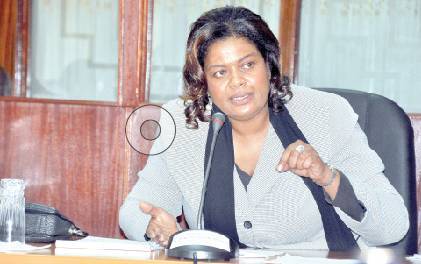Judge Njoki delivers dissenting view on eve of dad’s cremation

Supreme Court Judge Njoki Ndung’u yesterday stuck to the script she has nurtured, dissenting on one of the key anchors of the Building Bridges Initiative Bill.
Njoki, who attended the six-hour court session despite losing her father, Henry Rogers Ndung’u, a week ago, remained composed throughout. Characteristically, she did not shy away from charting her own path, differing with fellow judges on whether President Uhuru Kenyatta erred in initiating constitutional changes through the BBI.
Private ceremony
Her father died last Thursday and will be cremated in a private ceremony in Nairobi today.
Yesterday, Njoki took the bereavement in her stride. While the majority of judges led by Chief Justice Martha Koome found the President on the wrong for initiating and superintending the initiative and the attendant outcomes, including the controversial Constitutional (amendment) Bill 2020, Njoki dissented saying the Head of State had every right to originate such amendments, as does every other Kenyan.
“There is no doubt that the President is a democratically elected representative of the people who, under Article 1 (of the Constitution), can exercise delegated sovereign power of the people. Indeed, this is one of the ways in which constituent power is exercised under our Constitution.
“To limit the ability of an elected representative to speak, to act, to work on behalf of his or her electorate is itself a limitation of the people’s political rights under Article 38 of the Constitution,” she said.
The judge has established herself as fiercely independent, delivering judgments without the push to align her decisions to the majority on the bench. The other Supreme Court Justices are Philomena Mwilu, Isaac Lenaola, William Ouko, Smokin Wanjala and Ibrahim Mohammed.
In 2017, Njoki was one of the two judges who wrote the minority decision endorsing the re-election of President Uhuru despite the majority, led by former CJ David Maraga, in a landmark decision, annulling the victory and ordering repeat elections. Retired Justice Jackton Ojwang sided with her that year.
Yesterday, her colleague, Justice Isaac Lenaola, sided with her but only on what role the President played in the whole process.
Lenaola agreed with the other five judges that the President should not be involved in popular initiatives to amend the Constitution, but said the President did not play any role in the BBI Bill.
For the common man
“Article 257 was intended to be exercised by the common man and the civil society and not anyone outside that category. I have, therefore, no hesitation holding that the President cannot and should not initiate amendments to the Constitution under Article 257 … but in this particular dispute he did not,” said Lenaola.
Other than the dissent, she agreed with the majority of the judges on the other six issues.
Ibrahim also stood out for being the only one who agreed that the country’s Constitution enjoyed a basic structure that could not be changed whatsoever.
Eternity clauses
In a majority decision, the other six judges threw out earlier judgments by the High Court and the Court of Appeal that found that the Constitution had eternity clauses that could not be amended.
“It has been submitted that the doctrine of basic structure has yet to gain universal experience and for that reason we are asked to find that it is not applicable. I do not think it is necessary that before application of a doctrine of a legal principle the same must have universal application,” said the judge.
He also joined fellow Justices Mwilu and Wanjala in a majority decision in a finding that there was inadequate public participation before the Bill was adopted.











